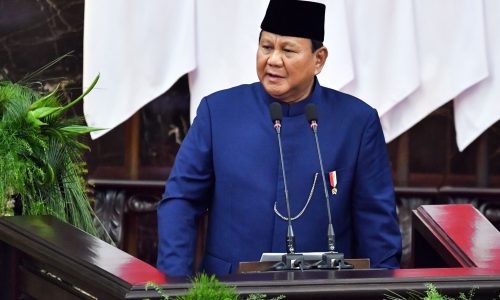Indonesia’s government debt has continued to increase significantly on both a monthly and yearly basis, primarily driven by the issuance of government securities (SBN), especially domestic SBN.
The Ministry of Finance reported that as of May 2024, the government debt position reached Rp8,353.02 trillion (about US$511 billion). This figure is up Rp565 trillion from May 2023 and up Rp14.59 trillion from April 2024.
Minister of Finance Sri Mulyani Indrawati said in the Finance Ministry’s monthly report, APBN Kita, as quoted on Thursday, July 4, 2024, that the debt ratio stands at 38.71 percent of the Gross Domestic Product (GDP), which is still below the safe limit of 60 percent of GDP as stipulated in Law No. 17/2023 on State Finance.
The government’s debt from SBN is Rp7,347.50 trillion, consisting of Domestic SBN at Rp5,904.64 trillion and Foreign SBN at Rp1,442.85 trillion.
Additionally, the government’s debt from loans amounted to Rp1,005.52 trillion, consisting of Domestic loans at Rp36.42 trillion and Foreign loans at Rp969.10 trillion.
Sri Mulyani highlighted that the majority of the government’s debt originates domestically, with a proportion of 71.12 percent. The composition of government debt is predominantly from SBN, making up 87.96 percent.
She emphasized that an efficient SBN market can enhance the resilience of Indonesia’s financial system against economic and financial market shocks.
“With debt financing activities through the issuance of SBN, the government also supports the development and deepening of the domestic financial market,” Sri Mulyani said.
To ensure efficient long-term debt management, the government aims to create a deep, active, and liquid domestic SBN market. This involves developing various SBN instruments, including thematic SBNs such as Green Sukuk and SDGs Bonds (SDG Bonds and Blue Bonds).
Furthermore, the government is promoting digital transformation in the issuance and sale of SBN, supported by online systems. This approach enhances the effectiveness, efficiency, and credibility of debt procurement through SBN.
Effective debt portfolio management is crucial for maintaining overall fiscal sustainability. The government is committed to managing debt prudently and measurably, focusing on interest rate, currency, liquidity, and maturity risks.
The debt ratio remains well-managed at 38.71 percent of GDP as of May 2024, consistently below the safe limit of 60 percent of GDP as per Law No. 17/2003 on State Finance. This ratio shows a decreasing trend from 40.74 percent in 2021, 39.70 percent in 2022, and 39.21 percent in 2023.
Debt management strategy
The government’s Medium-Term Debt Management Strategy for 2024-2027 targets maintaining the debt ratio around 40 percent, prioritizing medium to long-term debt procurement, and actively managing the debt portfolio.
As of the end of May 2024, the government’s debt maturity profile is considered safe with an average time to maturity (ATM) of 8 years. This disciplined debt management supports positive assessments from credit rating agencies (S&P, Fitch, Moody’s, R&I, and JCR).
“To date, Indonesia continues to maintain its sovereign rating at investment grade amidst global economic dynamics and financial market volatility,” Sri Mulyani concluded.









